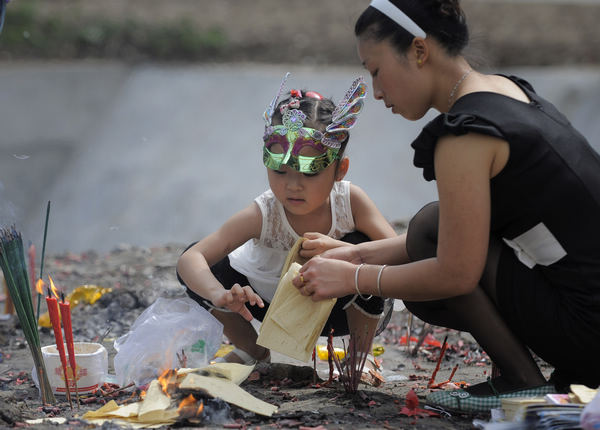News
Sichuan quake anniversary marked
By Huang Zhiling (China Daily)
Updated: 2011-05-13 07:02
 |
Large Medium Small |
|
 Li Qingjiang and her daughter burn incense and paper, a traditional way of mourning, for the deceased in Beichuan county, Sichuan province, on Thursday, the third anniversary of the Sichuan earthquake. Li lost 13 family members in the tragedy, including her husband. The quake occurred on May 12, Li's birthday, the only occasion her husband failed to send birthday greetings. [Photo/Xinhua] |
CHENGDU - Thousands of people gathered in the former administrative center of Beichuan, Sichuan province, on Thursday to mark the third anniversary of the 8.0-magnitude earthquake that hit the province on May 12, 2008, leaving 87,000 people dead and millions more homeless.
People waited, in a solemn, single file, to put fresh flowers in front of a cemetery where more than 7,000 victims of the quake were buried.
| ||||
Roads were packed with mourners at 7 am, two hours before the official mourning ceremony began. Many of the trees were dotted with white paper flowers, in memory of the dead.
More than 10,000 mourners - many of whom had lost relatives and friends in the quake - attended the ceremony, said official Zhao Kaisheng, but 100,000 people visited the ruins of buildings toppled by the quake to pay their respects.
People stayed until 2:28 pm when wailing sirens marked the exact time the quake struck.
With tearful eyes mourners lit candles and burned incense and paper money - a traditional way of mourning - as they remembered loved ones.
Among the crowd was Yang Chao, a bank employee who visited the ruins of Beichuan High School where more than 1,000 students and teachers, including his daughter and wife, were killed.
"Three years have passed. But the grief never dies," he said.
The government has rapidly mobilized assistance and funds in reconstruction, pumping in 885 billion yuan ($136 billion) to rebuild a staggering 37 cities and towns, nearly 3,000 schools and 4,500 km of highways.
One model for the reconstruction effort is New Beichuan, a town built from scratch.
"The enormous changes over the past three years have proved that people in this disaster-hit area will never back down," Premier Wen Jiabao said earlier this week.
In the mountain village of Yingxiu, now linked to the outside world by a series of tunnels and bridges, hundreds of new buildings stand around the ruins of Xuankou Middle School, where dozens of students and teachers were killed.
Coachloads of visitors go to the site to lay wreaths, take photos and sing patriotic songs, raising hopes that tourism might help lift the local economy.
Commemorative activities were also held elsewhere.
In Wenchuan county, the epicenter, a disaster relief exercise was held at a primary school.
In Chengdu, the provincial capital, a two-week-long photo exhibition is being held in memory of those killed.
As many bereaved people have remarried and moved from tents and temporary shelter into permanent homes, some aspects of life are returning to normal, said Ren Xuemei, deputy director of Beichuan's mental health service center.
But some people find the adjustment harder than others.
Liu Juhua in Beichuan still suffers nightmares.
"It usually starts with gigantic rocks rolling down the mountains and the ground convulsing, and then floods submerge schools and homes," she said.
Eight people from Liu's extended family were killed in the quake.
"I can't help but wonder if the soul exists. Why have I so often dreamed about my departed family members and friends over the past three years?"
Others, however, look to the future.
Niu Yu, an animated 14-year-old girl who lost her right leg, hopes to become a doctor.
"After I was rescued from the earthquake I saw people in white uniforms everywhere," she said. "It made me want to be one of those white angels. I want to help other people too.
"I feel the past is the past. The future is more important," she said.
Reuters, Xinhua contributed to this story.
| 分享按钮 |



